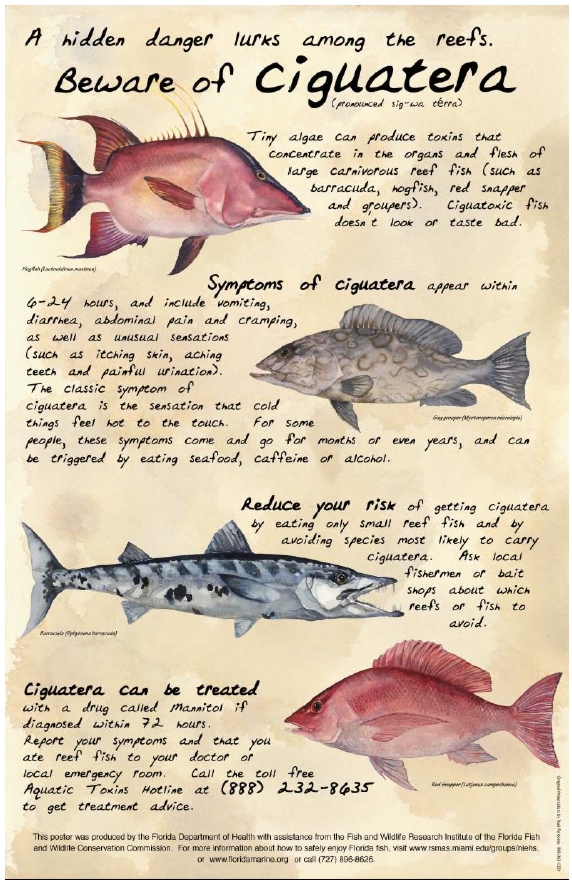What is Ciguatera and Ciguatoxin?
Ciguatoxins are poisonous compounds naturally produced by dinoflagellates, Gambierdiscus toxicus, which are microscopic organisms. These organisms are eaten by reef fish from tropical and subtropical waters. Also, carnivorous tropical fish may eat smaller fish that have eaten algae carrying ciguatoxin making them contain this toxin. Larger fish can be thusly more toxic, simply from eating more fish with the toxin.
Ciguatera is a disease caused by eating the fish which have accumulated levels of ciguatoxins, and is the most frequently reported marine poisoning disease in the world. Ciguatoxins accumulate inside the fish’s roe, skin, viscera, and head, and they cannot be cooked out of the fish.
All tropical fish are susceptible to ciguatera, as are mussels, clams, and oysters. There is no known cure for ciguatera, nor is there a proper test to diagnose a fish with this disease. While there is no known cure for ciguatera disease, and symptoms generally go away after a few weeks. In the Pacific, the mortality rate is less than 1% (1), mainly from eaten the organs of an infected fish. Ciguatera can be transmitted sexually (male to female), as well as passing through a mother’s milk to a breastfeeding infant (mother to child). Once ingested, gastrointestinal symptoms begin to occur within 24 hours, and neurological symptoms begin to occur within 1 to 2 days.
Symptoms include:
- Vomiting
- Itching
- Nausea
- Dizziness
- Hot/cold flashes
- Temporary blindness
- Hallucinations
- Other central nervous system dysfunction
Fish with ciguatera contain no odd smell or appearance, and is usually indistinguishable from a fish without the disease. There will be no odd taste or flavor coming from the fish itself. It cannot be cooked out, and cannot be removed by freezing or other preparation before cooking. Therefore, it is best to avoid eating viscera including liver, intestines, and roe of all tropical fish, and if traveling to tropical reef areas, to avoid eating certain species of fish altogether including the grouper, snapper, amberjack, triggerfish, lionfish, and barracuda, among others. The larger the fish, the more toxins it will contain.
Resources:
“Ciguatera Fish Poisoning.” Florida Department of Health. Florida Department of Health, n.d. Web. 16 Mar. 2014.
(1.) Fleming, Lora E. “Ciguatera Fish Poisoning.” Ciguatera Fish Poisoning. Woods Hole Oceanographic Institution, n.d. Web. 16 Mar. 2014.
“Ciguatera.” Wikipedia. Wikimedia Foundation, 15 Mar. 2014. Web. 16 Mar. 2014.


